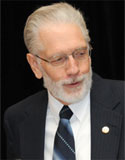Monday Morning, September 14
 |
| UE General President John Hovis |
John Hovis called the UE 71st convention second session to order at 9:00 a.m. Monday and recognized the Resolution Committee co-conveners Peter Knowlton, Jessica Harig (203) and Dawn Knight (170).
Jeannette Weiland of Local 208 in Vermont suggested an amendment on the issue of employers hiring temporary workers to replace permanent full-time employees. The delegates agreed to the proposal and added a sentence that called on locals to "resist the employer’s efforts" to replace permanent employees with temporary employees. Paul Whitman (267) proposed an amendment to emphasize training when employees lose their jobs. This was also approved by the delegates. Other delegates who spoke up to debate this resolution were Annie MacDonald (222), Carmyn Stanko (Northeast Region), Armando Robles (1110), and Bruce Dotson (170).
Annie MacDonald said we need to advise new members regarding collective bargaining: “You won’t get it all the first time, but if you don’t put it out there and stand your ground, they’ll never respect you.”
Dawn Knight then read the resolution “Collective Bargaining Rights for Public Employees.” Annie MacDonald emphasized the importance of gaining the right to strike for all public employees, as well as standing behind workers in states without collective bargaining rights. Delegates from such “right to work” states stood up to give their perspective, including Jeff Watson (170) who reported that the governor of West Virginia earlier this year said that “collective bargaining for public workers would be a good idea.” Watson suggested that once the governor opens that door a crack, “we have to stick our foot in it and don’t take it out until we get” bargaining rights.
LABOR HISTORIAN DAVID MONTGOMERY
President Hovis introduced the prominent labor historian, David Montgomery, retired professor at Yale and a former UE Local 475 member, steward and shop chairman in New York City in the 1950s. Montgomery talked about workers’ struggles in New Haven, particularly at Sargent, that paved the way for UE. Because AFL craft unions excluded Italian immigrants, they formed their own union at Sargent, the “General Union of the Italians,” which struck Sargent in 1902 in a fight against low pay, exploitation and discrimination. The strike was brutally broken, but when UE was organized at Sargent decades later, older immigrant workers said it was revenge for what the company did to them in 1902.
“Every now and then the labor movement gets a shot in the arm from new immigrants” who introduce new ideas, new forms of organization and struggle, and new energy into the U. S. union, said Montgomery. He described how the recurring demand for industrial unions that welcome all workers, as opposed to exclusionary craft unionism, manifested itself in the 1916 strike of Westinghouse workers in East Pittsburgh, and the 1918 GE strike initiated by workers in Erie. The Erie GE workers took the lead in trying to build the first U.S. union “built on a shop-steward basis.”
Montgomery related some other highlights of UE history, including the 1946 strike of UE and other large CIO unions which became a general strike in several cities. He described how UE was the first union to fight against pay inequality affecting women who were at the bottom of the payscale, and in the 1946 strike fought to make GE and Westinghouse begin reducing the gender pay gap. He described the corporate counter-attack, which included the 1947 anti-union Taft-Hartley Act and the Cold War, in the words that corporate managers themselves used to describe it, as a fight for “the right to manage” against those who actually did the work.
'ONLY AS STRONG AS THE RANK-AND-FILE'
Dr. Montgomery recognized the workers of Republic their fight’s lessons for the labor movement. But he told the Republic delegates “We beat you to it.” In 1954, members of his own amalgamated New York Local 475 conducted a sit-down strike at American Safety Razor to try to stop the plant from moving. The lessons of Republic, he said, are that union is only as strong as the actions of its rank-and-file members, unions must build solidarity, including international and solidarity must be international (NAFTA brought that home), and the importance of political action.
Delegates then discussed the resolution "An Economy for All." Western Region President Carl Rosen called this resolution "the fight of our time." He recommended that local leaders connect with Jobs with Justice and other groups that are "taking on the banks." Donald Wolfe (777) offered an opposing view of the resolution and emphasized that the nation’s debt "needs to come down." Sandy Coulter (767) stood up in support of the resolution and said, "It is outrageous that the people who put us in this position are getting record bonuses." Angaza Laughinghouse of Local 150 also spoke up to say, on behalf of ‘right-to-work’ states that "Right to work exists because people say they don’t want government intervention."
Other delegates speaking on the resolution were Carmyn Stanko (Northeast Region), Ricky Maclin (1110), Bill Lynch (262), Andrew Dinkelaker (Eastern Region), Peter Knowlton (Northeast Region), Jason Trayer (506), Jessica Harig (203), Bruce Dotson (170), Pat Rafferty (506), Bruce Reese (332), Dennis Hayda (751), Jonah Neale (255), and Armando Robles (1110).
The convention recessed for lunch, but first the delegates conducted a march to New Haven City Hall where they rallied for single-payer healthcare and the Employee Free Choice Act.
